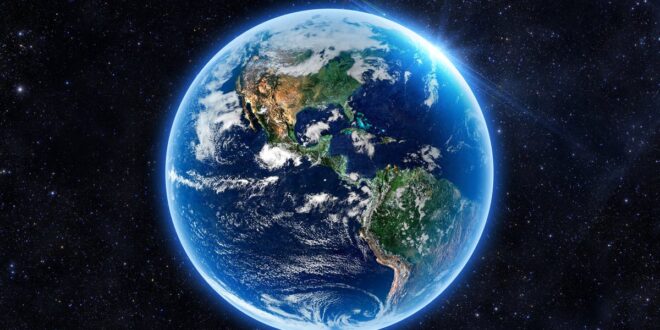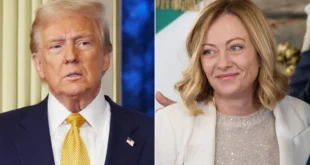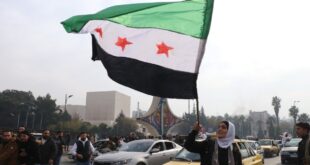Assaf Orion, Shahar Eilam, Tomer Fadlon, Oded Eran, Eldad Shavit, Daniel Rakov, and Shira Efron
2021 was marked by the global efforts to recover from the turmoil of the COVID-19 crisis, and in particular, its severe economic impacts. The focus of the global economy continued to move eastward, while the strategic competition between the United States and China deepened. The Biden administration is engaged in reorganization and adaptation, and attempting to restore the United States’ standing at the head of the camp of democratic countries. The climate crisis is high on the global agenda, alongside other urgent issues, including the Russia-Ukraine tension and the Iranian nuclear program.
It is likely that in 2022 as well, the world will experience additional waves of COVID-19, vaccination disparities, and differences in ways to cope with the pandemic. These will continue to disrupt production and supply chains, and perhaps cause an inflation crisis. Asia’s economic standing will continue to rise, and in tandem, the importance of the Middle East and the global attention it commands will continue to decline. Internal stability (political-economic-social) will continue to be a top priority for most countries in the world. Great power competition is expected to intensify, and in turn, heighten divisiveness and sharpen the lines between competing camps. The US administration will try to strengthen its relations with allies around the world and in tandem, form a coalition of democratic countries as a counterweight to the autocratic regimes, chiefly China and Russia. In this context, the issue of human rights is recapturing a central place in international relations. The climate crisis is expected to be at the top of the global agenda as the great challenge facing humanity in the current generation, a barometer of norms in the international arena, and a central basis for both cooperation and competition.
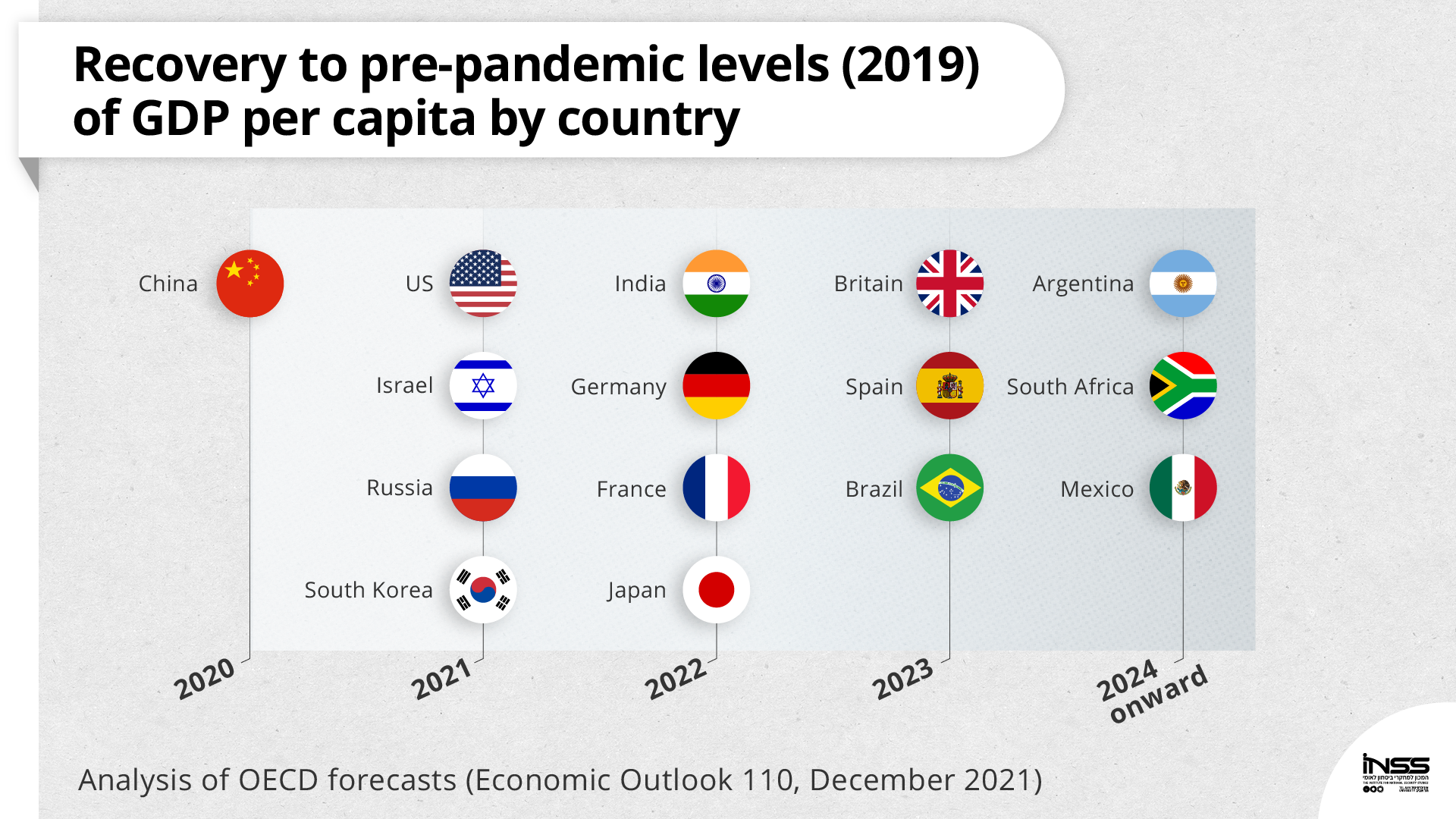
In 2022 the global economy will likely face continued formidable challenges, including supply chain disruptions, ongoing since January 2020; the struggle between the United States and China, whose combined contribution to global production stands at 42 percent; increased prices of goods and the danger of inflation returning to center stage after a 35-year absence; and the threat posed by offensive cyber activity toward businesses in an age of increased digitization. In addition, the lack of vaccines in the less wealthy countries endangers the global recovery, as will new vaccine-resistant strains. Thus, the past year has witnessed attempts by some countries and industrial sectors to reduce dependence on global chains and even return a small portion of production to the developed world. The phenomenon is not yet widespread, but if it grows it will impact greatly on the global economy in the coming years.
The policies of the world’s governments and central banks during the pandemic, joined by the need for digitization services, created considerable demand for Israeli technology services, which in turn benefited the Israeli economy both in increasing growth and in moderating inflationary pressures. The flow of foreign capital to Israel strengthens the shekel and makes importing to Israel cheaper. However, the economic boom in Israel will be influenced by global processes and requires more investments in technological human capital and in communications infrastructure in order to answer the growing local needs.
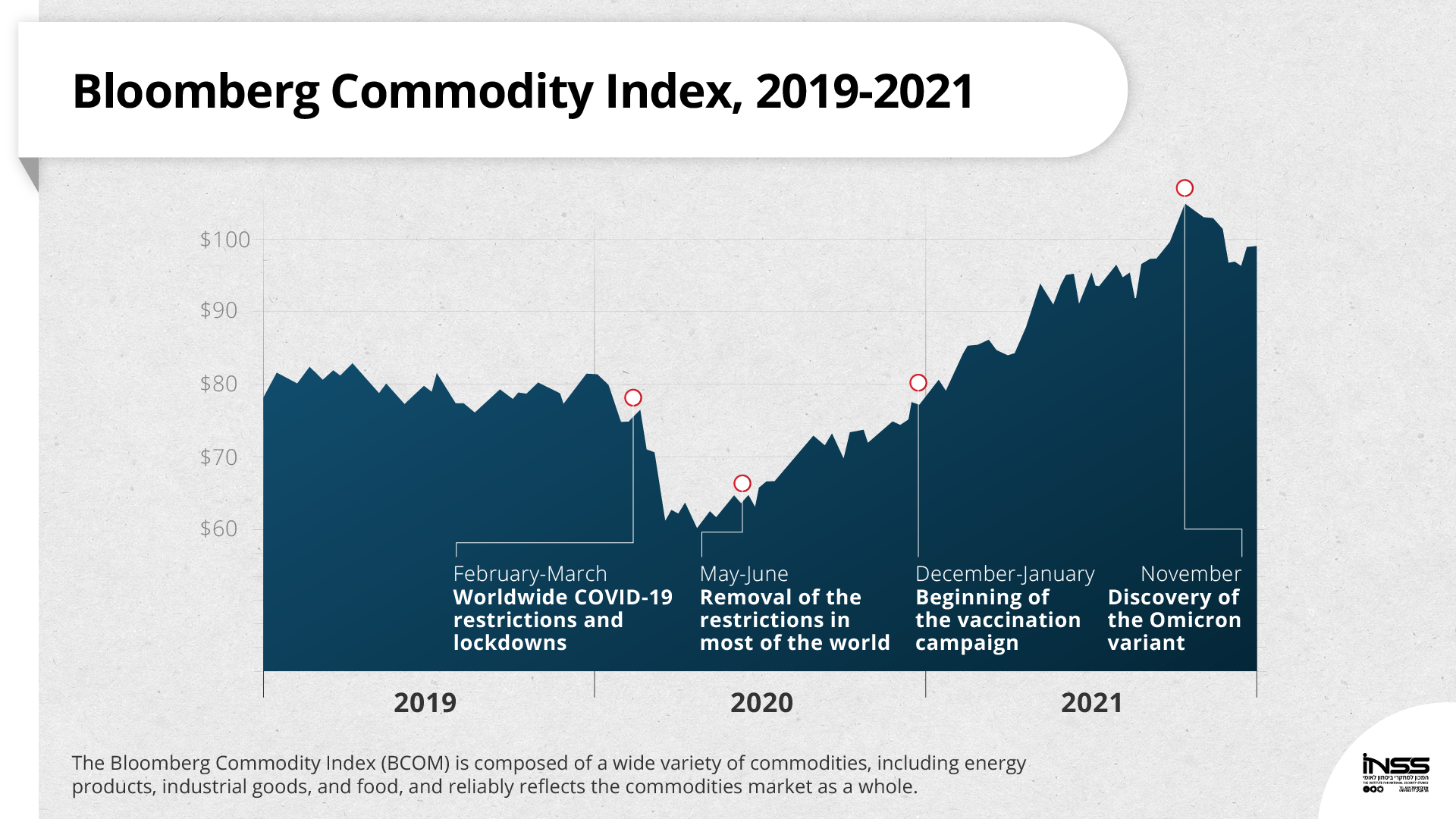
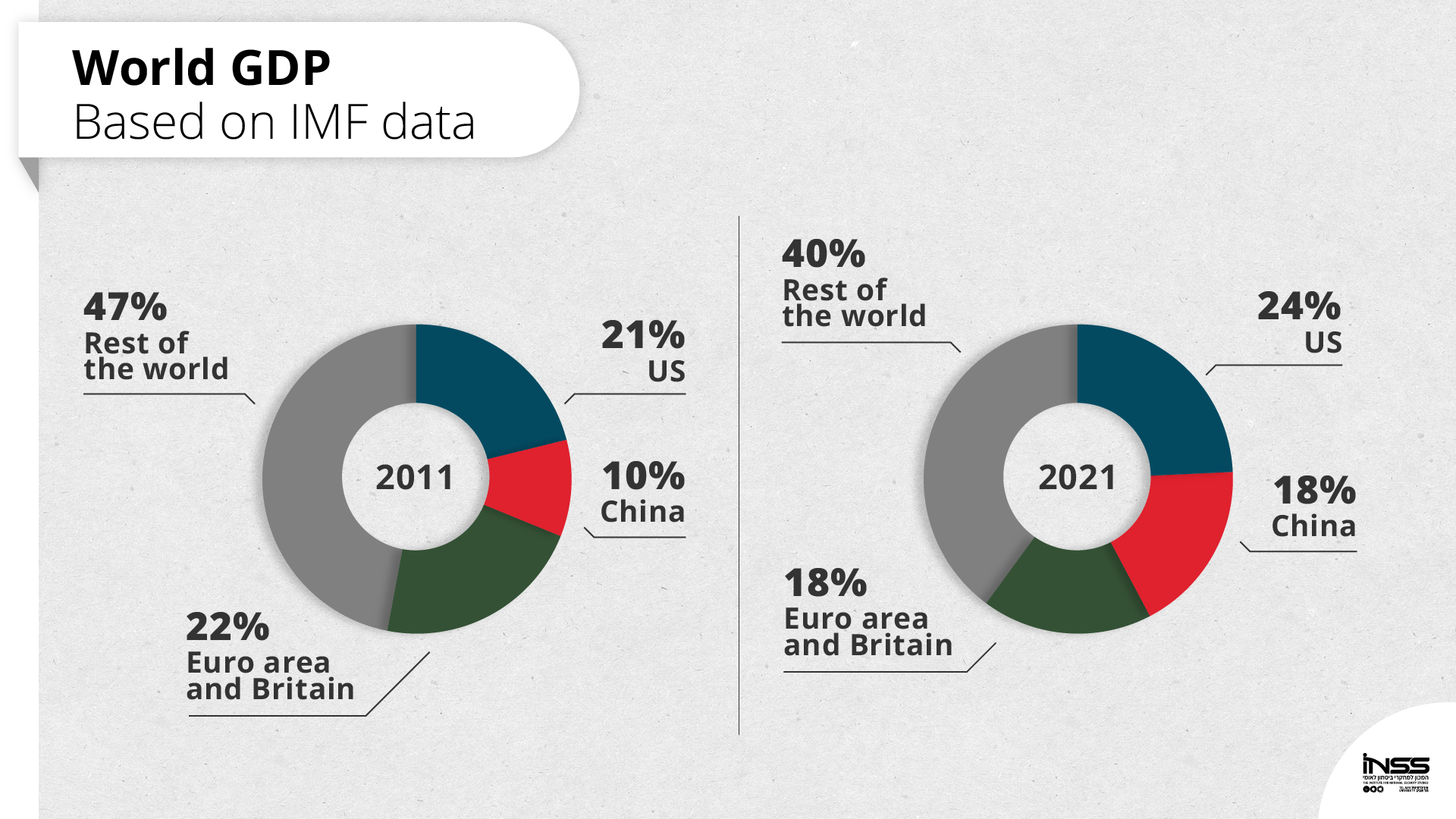


In the United States, the first year of the Biden administration was dedicated to reorganization, first and foremost for advancing the domestic agenda, centered on upgrading infrastructure and the economy while eradicating COVID-19. The administration aspires to complete its main measures in the domestic arena soon, out of concern that it will lose the Democratic majority in both houses of Congress in the midterm elections (November 2022). In foreign policy, the “pivot to Asia” trend has strengthened, with attention and resources focused on the challenges posed by China, and an emphasis on developing capabilities and strengthening partnerships with allies in Europe and Asia. Other leading issues include climate change and controlled confrontation with Russia.
The strategic competition between the United States and China will continue to be the most important element shaping the international system. This competition is over the structure of the system, its rules, norms, and underlying content. This is a multi-faceted competition over values and ideology and over economic, technological, and military superiority. It is waged in geostrategic loci of friction, including Taiwan, the South China Sea, and the Arctic region. The competition intensified over the past year, especially against the backdrop of the Biden administration’s increased pressure on China regarding its conduct on human rights, Taiwan, bilateral trade, and its efforts at political influence via economic activity throughout the world, including in strategic and sensitive fields. This trend will continue in the coming years, with additional partners expected to heighten the American pressure – the European Union, the UK, Australia, Canada, Japan, and South Korea. China for its part will try to continue to leverage its quick recovery from the COVID-19 crisis, but will also be forced to cope with vulnerabilities in its economy, including the insolvency of the Chinese real estate giants.
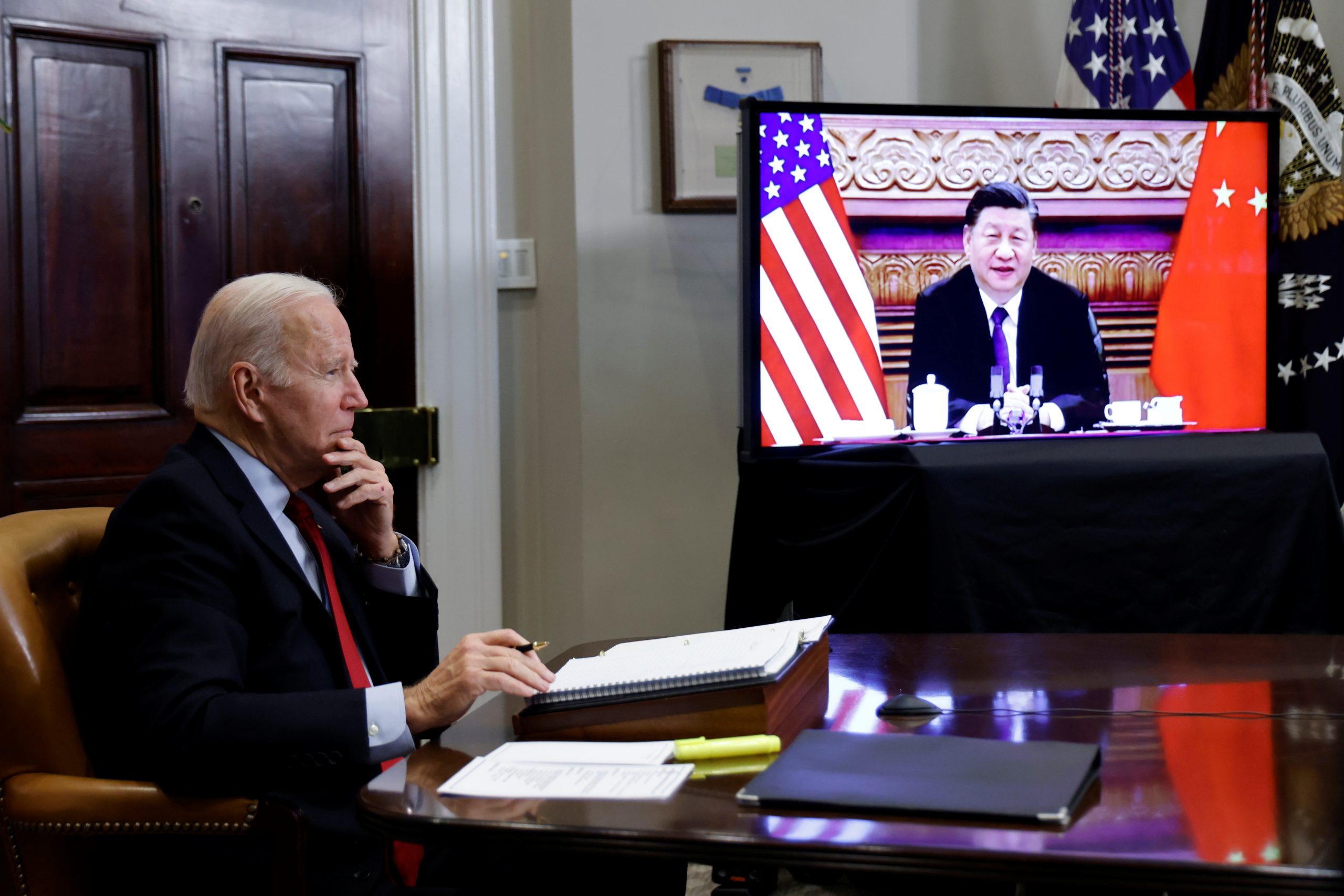
The competition between the US and China will continue to be of major influence. President Biden and President Xi in their virtual meeting
Photo: REUTERS/Jonathan Ernst
In January 2021 the climate crisis resumed a leading role on the global agenda, with President Biden’s assignment of the issue to the top of the United States national security priorities and the US return to the Paris Accords, after the withdrawal from the agreement by President Trump. The Climate Change Conference was held in Glasgow in November, and countries presented their plans for addressing the crisis and their commitments to reduce greenhouse gas emissions in the current decade; several important agreements were signed. The main keys to progress are China’s level of cooperation with the global process that the United States is spearheading, despite the rivalry between them, and the scope of the economic aid to developing countries in order for them to advance to green economies. In 2022 another international conference will be held in Sharm el-Sheikh, and in 2023 in Abu Dhabi, and they are expected to focus, inter alia, on the implications of the climate crisis for the Middle East and North Africa.
Europe was hit with a new serious wave of COVID-19 at the end of 2021, exacerbating the economic sluggishness on the continent and emphasizing the reduced cohesion and weakened leadership in the European Union. These developments will test the new liberal-democratic government in Germany, the economic and diplomatic engine of Europe, which replaced the conservative government of Angela Merkel. In 2022 Europe is expected to continue to cope with the problem of migrants and refugees from areas stricken with political conflicts and economic crises in Africa and Asia.
Russia has identified the current period as an opportunity to formulate new rules of the game in its relations with the West, given relative quiet at home alongside the high energy prices boosting its economy, the Biden administration’s focus on its domestic arena and on China, and the many internal challenges facing the countries of Europe. On the other hand, the coming years could be more challenging for Moscow, with increasing pressure for generational change in the leadership (2024 presidential elections) and the need to adapt its economy, which relies on the export of hydrocarbons, to the green agenda. The deployment of Russian forces on the Ukraine border in late 2021 is aimed at testing the West and forcing it to engage in dialogue with Moscow beyond the issues of arms control and cyber, and to recognize Russian interests in the post-Soviet world. Despite the risks of escalation, it seems that Russia is not interested in large-scale military conflict in Ukraine, which would lead to further deterioration of its relations with the West.
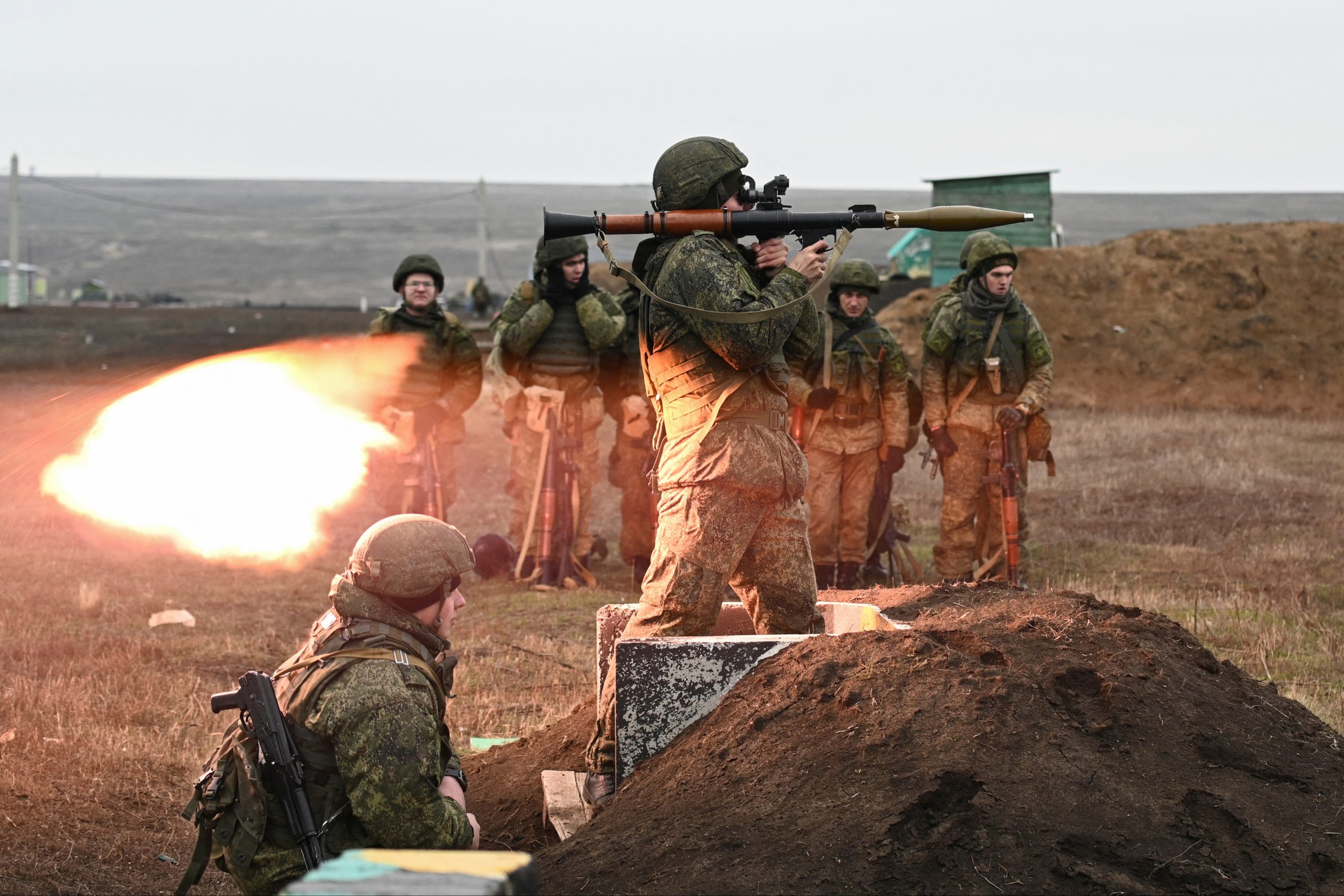
Test of the Western states. Russian soldiers near the Ukraine border
Photo: REUTERS/Sergey Pivovarov
The Middle East and Israel
Against the backdrop of global trends, it is clear that the international community is eager to pay less attention to the Middle East, and strives to contain crises and lessen involvement in the region as much as possible, particularly military involvement that exacts a high toll. The hasty withdrawal of the forces of the United States and its partners from Afghanistan strengthened the assessment in the region that the US is reducing its involvement and commitments, even though at this stage it does not intend to change its military deployment in the Gulf, Iraq, and Syria.
The focus of global attention in the region is Iran. The US administration’s overall policy in the region will be affected by the progress of the Iranian nuclear program and by developments in the talks on returning to the agreement, underway in close cooperation with its European partners. With the crossroads for making a decision on the Iranian issue approaching, there are substantial gaps between Israel and the rest of the relevant countries regarding the urgency of the issue, definition of the threat, and ways to address it, and the international community could accept foot-dragging and containment as a convenient alternative. Developments in the conflict of the US and Europe vis-à-vis Russia could also influence the ability to formulate joint action on Middle East issues, chiefly the Iranian nuclear program and the settlement process in Syria.
The Biden administration is taking a positive approach to the Abraham Accords and is interested in continuing to strengthen Israel’s relations with the region’s countries, while demonstrating limited attention to the Palestinian issue in light of its assessment that the chances of progress at this time are very low. However, the sense of relief in the United States and Europe at the change of government in Israel will not lower expectations that Israel implement a restrained policy when it comes to the settlements and human rights issues, particularly in the West Bank. Criticism of Israel on the Palestinian issue could continue to prevent the convening of the EU-Israel Association Council and impede the advancement of relations between Israel and the EU.
Jews in communities worldwide are experiencing increased personal and community security challenges given continued processes of social upheaval, polarization, and political radicalization, and the concomitant continued rise in antisemitic and anti-Israel incidents, which increased in the past year, especially following Operation Guardian of the Walls. The core issues – Jewish continuity and the connection to Israel – will also be top priorities for the communities. The midterm election year in the United States is expected to be characterized by increasing politicization of support for Israel, in a way that will also affect the Jewish community. In Israel, the issue of relations with diaspora Jewry could become a political dispute, given the Israeli government’s welcome attempt to turn over a new leaf, particularly with the liberal streams, by establishing channels of dialogue and pursuing confidence building measures, including implementation of the Western Wall compromise.

The United States is reducing its involvement in the Middle East.Withdrawal of US forces from Afghanistan
Photo: Latin America News Agency via REUTERS
Policy Recommendations: Heightening the Sense of Israel as an Asset to the International System
Efforts to recover from the COVID-19 crisis will continue to be at the top of the global agenda in 2022. The strategic competition between the United States and China will accelerate the increasing divisiveness into competing camps and will project onto the entire international dynamic. Coping with the climate crisis will become the main test of the international community’s ability to cooperate, despite the disagreements and conflicting interests. As part of the United States’ measures as the head of the camp of democratic countries, the issue of human rights is returning as a central consideration in international policy and relations. In the absence of a flare-up that requires intervention and the investment of resources, the Middle East is expected to be caught in the tension between its low place among the priorities of the global system and its ability to draw attention through crises and threats. Developments regarding the Iranian nuclear issue and the results of the negotiations on the return of Iran and the United States to the agreement will shape the interactions of the great powers with the region considerably. The deep polarization in the United States and the midterm elections there could limit its support for Israel and reduce its leeway on issues that the countries disagree on.
Given these trends, there is clearly a large gap between the potential inherent in Israel’s collective assets – in economics, technology, cyber, energy, water, medicine, defense, and regional relations – and its ability to advance its essential political and military objectives, most of which are less important to the rest of the world. This gap requires heightening the sense of Israel’s value as an asset in the region and in the international arena:
- In the Middle East, Israel must highlight its assets and increase its activity as a stabilizing force that plays a larger role in regional responses to destabilizers and to the vacuum left by the decreasing international involvement in the region.
- In the world at large, Israel should develop its comparative advantages in order to situate itself as a central partner on global issues, chiefly climate and technology.
Realizing these assets requires a strong buildup process, centered on strategic, long-term government investment that involves systemic changes and the investment of considerable resources in the economy, technological innovation, communications and information infrastructure, science education, foreign relations, and defense systems. Improved performance requires strengthening the governmental mechanisms that deal with understanding the complexity of the international system – the multiplicity of players, frameworks, and issues on the agenda – and formulating suitable differential policy.
In addition, it is recommended that Israel:
- Maintain political leeway vis-à-vis the leading actors in the international system, without undermining its special relations with the United States.
- Strengthen the dialogue and coordination with Washington on the main issues that are important to both parties – Iran, China, normalization in the Middle East and regional development, the Palestinian issue, human rights, and the future of US involvement in the region.
- Strengthen the US administration’s attentiveness to Israel’s positions through continued discreet dialogue; refrain from publicizing disagreements and from defiant actions; take the administration’s interests into consideration, while emphasizing Israel’s political, military, and economic needs and its ability to contribute to the advancement of US objectives in the region and beyond.
- Increase the value of its assets to the United States, in particular by deepening cooperation in the fields of cyber and technology.
- Strive to maintain bipartisan American support (public and political) for Israel, and to expand the efforts to improve relations with the American Jewish community.
- Continue to develop productive and safe economic relations with China (on the 30th anniversary of bilateral relations), while mindful of the US sensitivity on this issue and its demands. Maintain open channels of dialogue with Moscow, in particular with regard to Iran and the northern arena, while maintaining transparency and close coordination with Washington.
- Strengthen the political dialogue with the institutions of the European Union and expand cooperation with Brussels on the issues of climate, cyber, and counterterrorism, alongside dialogue on the issue of economic development in the region and in the Palestinian arena.
- Consider the issue of world Jewry in decision making processes, and in this context establish a central body and mechanisms of dialogue and consulting. Define Israel-diaspora relations as a national mission, centered on education, encounters, and dialogue, alongside a joint address to challenges (identity, continuity, connection to Israel, and the fight against antisemitism).
 Geostrategic Media Political Commentary, Analysis, Security, Defense
Geostrategic Media Political Commentary, Analysis, Security, Defense
